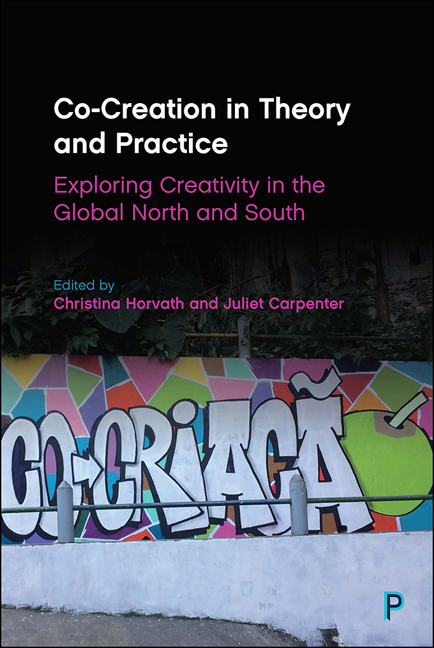1 - Introduction: Conceptualising Co-Creation as a Methodology
Published online by Cambridge University Press: 18 March 2021
Summary
Introduction
Since the neoliberal turn of the 1980s and the globalisation of trade and information flows a decade later, cities around the world have been faced with the increasingly complex societal challenges of ‘spatial segregation, separation and exclusion’ (Bauman, 1998: 3). The protection of private property rights and the reduction of state expenditure have resulted in a radical polarisation of the distribution of wealth and power. At the same time, the expansion of the urban lifestyle has turned cities into commodities for those with money, encouraging the formation of market niches in consumer habits and cultural forms (Harvey, 2012: 14). As a result, we are living in increasingly fragmented, conflict-prone cities with privatised public spaces, increasing surveillance and growing divides between gated communities and vulnerable neighbourhoods. While new hierarchies founded on global mobility have sharpened the divide between the extraterritorial elites and the localised groups ever more affected by urban marginalisation, close-knit communities and ideals of urban identity, belonging and citizenship have become increasingly harder to sustain.
Despite the growing number of studies exploring urban disadvantage and territorial stigmatisation, knowledge generation about processes of marginalisation remains largely the remit of academic research, considered as the key source of understanding and insight to enhance societal awareness. Yet it has been increasingly recognised that alternative approaches to producing knowledge can lead to much greater societal benefits. According to Lupton and Dyson (2015), quoted in Campbell and Vanderhoven (2010: 10), ‘knowledge of the social world must be deeper and stronger if it is co-produced with actors in that world; research is more likely to effect change if it is owned by people who have a capacity to effect change’. To respond to a growing need for co-produced knowledge, this book proposes to challenge territorial marginalisation by inviting to the dialogue partners who rarely participate in collaborative knowledge practices (Banks et al, 2018), namely non-academic collaborators from the civil society sector and communities carrying knowledges that have previously been passed over, and those outside the Global North, increasingly validated as examples of the ‘epistemologies of the South’ (Santos, 2018).
- Type
- Chapter
- Information
- Co-Creation in Theory and PracticeExploring Creativity in the Global North and South, pp. 1 - 20Publisher: Bristol University PressPrint publication year: 2020

